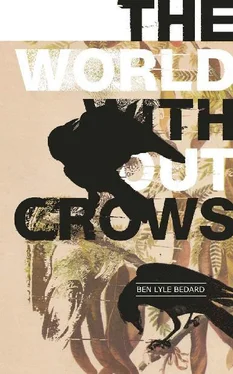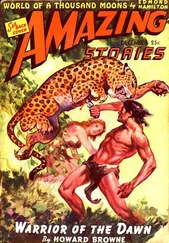They had moved through the town of North Tunbridge and had camped in within sight of route 91, when, after they had set up camp and eaten, and Birdie had drifted into sleep, Lucia approached him. The wild, womanish scream of foxes were sounding around them.
“Are you okay, Eric?” she asked.
“I am, yes,” he said. She frowned, as if this was not the answer she wanted to hear. She would prefer it, Eric realized, if he was tortured by what he had done.
“Why did you do that to Remember?” she asked.
“I did it because he might’ve been stealing from us,” he said.
“You can’t treat people like that. It was cruel.”
“It was,” Eric agreed. “And I would do it again.”
“Eric,” Lucia sighed, disappointed.
“What I did was only cruel if he wasn’t stealing from us,” Eric said. “What if he was? What if that’s his thing? He lures people up to his cabin and steals from them. Maybe he kills them too, who knows?” Eric shrugged. “He shouldn’t have been in our bags. He broke the trust, not me. If he would do that, what else would he do?”
Lucia shrugged, but Eric could see she was unconvinced.
“I don’t take chances. Not anymore.” Eric looked away, into the darkness that hovered over the fields.
“Okay,” Lucia said, but her voice was strained with irritation, sadness, even anger.
They sat together anyway, watching the clouds pass over the moon and listening to the screaming of foxes.
_
The next day they came to the Connecticut River and began following it north. It was too dangerous to swim. They would have to find a bridge. The weather was beautiful and warm and the landscape was green, cut through by the flashing, dark river. At around noon, Sergio asked to stop. He took out his fishing gear and walked down to the river.
Eric and Birdie sat by the river and watched him fish. He had become a good fisherman. Perhaps he was a natural, a gift he would never have found if the world had not ended. He stood at the bank and flicked his wrist, sending the line over the water. Then he waded into the water, holding the line in one hand, watching as his line pulled down the river.
“Do you want to draw, Birdie?” Eric asked.
“I don’t have any crayons left,” she answered. She put her chin on her knees stoically.
“Why didn’t you say something?”
Birdie shrugged heavily. Eric put his hand on her head.
“I’ll get you more, okay?”
Birdie nodded her head, but she wouldn’t look at him.
For lunch, Lucia and Eric cooked the fish Sergio caught. As they ate, Eric watched Sergio. He sat back at ease, watching the river. Eric had never seen him as relaxed. He was becoming who he was meant to be.
_
Lucia tried to talk Eric out of it. She said that it was dangerous and foolish to risk cracked Zombies for crayons. But Eric would not be dissuaded. He couldn’t explain to Birdie why he had treated Remember the way he did, but he could find crayons.
The house they found was up on a bank overlooking the river. It was a two-story Victorian with peeling blue paint and white trim. It had a vast wooden deck and a barbecue rusting upon it. Eric imagined a large family had once gathered there to eat hamburgers and watch the river. A large family with children, grandchildren. Crayons. Now, like all houses, it carried with it a lugubrious silence, like grief solidified. Despite their pleas, Eric insisted that Sergio and Lucia stay with Birdie while he went inside. Eric wouldn’t risk anyone but himself. Birdie was strangely quiet, as if she understood that Eric did this for her, to make up for Remember, as if this was justice and Eric deserved it.
Leaving them at the forest line by the river, Eric pulled on his empty backpack, pulled out his .22, and walked into the open. Beneath his feet, his steps resounded hollowly on the wooden deck. He had a feeling then of utter foolishness, that he was risking his life for nothing. It was the reason Brad had died, in his obsessive need of a gun. Eric would die for crayons.
But he didn’t stop. He didn’t turn around. It was dumb, he knew it, but he owed Birdie something. His heart beat inside a great feeling of foreboding. As he neared the house, the feeling of doom increased. When he touched the sliding glass door to the house, he thought to himself, this is it. There is something here. There is something here and I am going to die.
He pulled the sliding door open.
Inside was a quiet plush carpet, the color of robin eggs. Eric stepped inside, listening for any sound of a Zombie, scratching a wall or shuffling in their mindless way. There was nothing, only the carpet beneath his feet. There was a couch at one end of the room and a television on the other. In the middle was a glass coffee table. Everything was covered with dust. Eric stepped forward, his gun ready. Through the living room was the kitchen, where he would find food. Maybe. He stepped quickly across the room and then winced as his hiking boots clomped on the linoleum.
Then, turning, he saw him: a man with a gun. Eric froze, staring at the man, who likewise didn’t move but kept his gun trained on him. His dark hair was knotted and long. He had a lean dirty face and cold eyes. The man was ruthless, he could tell. Tough, relentless. He was like a haggard, starving dog, vicious and merciless. He could see it in his coldly burning eyes, measuring him, searching for weakness. Cruel, unsympathetic eyes. His clothes hung off him in tatters. He still had the gun pointed at him, and his hands did not shake. He was a killer, he could see it plainly, a man who had done things and would do more. It was in his eyes. Oh god, Eric thought, he’s going to kill me. Eric had to make a decision. When he pulled the trigger, the blast roared in his ears. The man shattered to pieces and fell to the floor. Where he had stood, there was only shards of glass.
Eric stood in shock and then felt ill. His mind buzzed as he slowly understood. He fell to his knees, sick. When the rest of them burst into the room, they saw Eric kneeling on the floor amidst broken glass.
“What happened?” Lucia asked, her face pale.
“It was a mirror,” he said to them blankly.
“But who did you shoot?” Sergio asked.
“Myself.”
_
The house was empty of Zombies. While the rest of them looted all they could find, Eric stepped quietly into the bathroom, locked the door behind him, and looked at himself in the mirror. Again, he felt as if a stranger were looking at him. Eric had lost all his extra weight. His arms were strong and his face, lean and hawkish. He moved his face first one way and then the other, searching for something to recognize. But his cheekbones were strong and tall, his chin came to a rounded point, like a hammer, and there was even a darkish growth on his face, uneven. It was difficult to see the Eric in his own image.
He was filthy. He reminded himself of a stray dog, dangerous and starving, like the ones he had seen devouring the putrid remains of Zombies. Eric searched and found a razor and a bar of soap. In a bedroom, he found a new pair of clean jeans and underwear and a long-sleeved but light shirt that advertised the Tunbridge World’s Fair. Since 1867, it said.
With a pair of scissors he found in a drawer, Eric sheared his long hair. Then he shaved his face, painfully, in the mirror. When he was done, he walked down to the river with soap and shampoo and scrubbed himself, the soapy water running dark and gray from his body. He scrubbed until his skin was raw and sore.
The others didn’t bother him during the process, although Lucia came to him after he was done with a pair of scissors. Wordlessly, Eric allowed her to trim his hair, fix the garish cuts he had made. Her lithe fingers were tender as they worked. After she finished, Eric said thank you and gave her an abashed smile. She smiled back, a look of pity on her face, Eric thought.
Читать дальше












